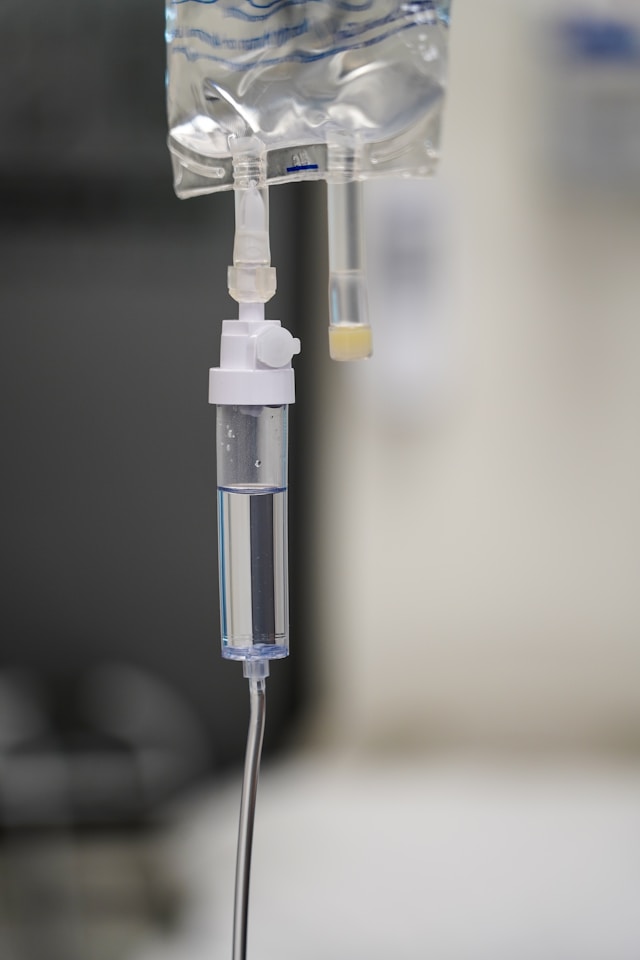
Entyvio (Vedolizumab) Infusions Explained


Dr. Chen is a board-certified immunologist with over 15 years of experience treating autoimmune and immunodeficiency disorders. She specializes in IVIG therapy and has published extensively on immune system treatments.
Medical Disclaimer
Entyvio (vedolizumab) is a gut-selective biologic medication specifically designed for inflammatory bowel disease, offering powerful disease control for Crohn's disease and ulcerative colitis patients. As an integrin receptor antagonist that works only in the gastrointestinal tract, Entyvio provides effective IBD treatment with potentially fewer systemic side effects than other biologics. Understanding how Entyvio works and what to expect helps you navigate this important therapy.
Key Highlights
- Entyvio is a gut-selective biologic that prevents inflammatory cells from entering intestinal tissue, working specifically in the GI tract without systemic immune suppression.
- Infusions take approximately 30 minutes and are given every 8 weeks after loading doses, making it one of the quickest biologic infusions.
- Many IBD patients achieve clinical remission and mucosal healing with Entyvio, with excellent safety profile due to gut-selective action.
What Is Entyvio
Entyvio (vedolizumab) is a monoclonal antibody that binds to α4β7 integrin, a protein found on certain white blood cells. By blocking this integrin, Entyvio prevents these inflammatory cells from leaving the bloodstream and entering intestinal tissue, where they would otherwise cause the inflammation that damages the gut in IBD.
What makes Entyvio unique is its gut selectivity. While other biologics work throughout the entire body, Entyvio specifically targets the integrin used by cells to enter gastrointestinal tissue. This means Entyvio works where it's needed—in the intestines—while having minimal effects on immune function elsewhere in the body.
According to the Crohn's & Colitis Foundation, this gut-selective mechanism gives Entyvio a favorable safety profile with lower systemic infection risk compared to TNF inhibitors.
Conditions Treated with Entyvio
Entyvio is FDA-approved for:
Ulcerative Colitis: Moderate to severe UC in patients who haven't responded adequately to or lost response to conventional therapy or TNF inhibitors.
Crohn's Disease: Moderate to severe Crohn's in patients who haven't responded adequately to or lost response to conventional therapy or TNF inhibitors.
Entyvio is particularly valuable for patients who've failed TNF inhibitors like Remicade or Humira, offering a different mechanism of action when TNF blockade hasn't been sufficient.
How Entyvio Works
The α4β7 integrin on lymphocytes (white blood cells) acts like a "homing device" directing these cells to gut-associated lymphoid tissue. When inflammatory lymphocytes bearing α4β7 integrin circulate past intestinal blood vessels, they recognize adhesion molecules (MAdCAM-1) on intestinal vessel walls, bind to them, and exit the bloodstream to enter intestinal tissue where they cause inflammation.
Entyvio blocks the α4β7 integrin, preventing this binding process. Inflammatory lymphocytes continue circulating in the bloodstream but cannot enter intestinal tissue. This reduces intestinal inflammation while preserving immune function in other body systems.
According to the Mayo Clinic, this selective mechanism explains why Entyvio has lower systemic infection rates than biologics that suppress immunity throughout the entire body.
Entyvio Dosing and Schedule
Loading Doses:
- Week 0: First 300 mg infusion
- Week 2: Second 300 mg infusion
- Week 6: Third 300 mg infusion
- Total initial phase: Three infusions over 6 weeks
Maintenance Dosing: After loading, 300 mg infusion every 8 weeks indefinitely as long as treatment remains effective and tolerated.
Infusion Duration: Approximately 30 minutes per infusion, one of the quickest biologic infusions available.
Combination Therapy: Many patients continue immunomodulators (azathioprine, 6-MP, methotrexate) alongside Entyvio, though unlike TNF inhibitors, Entyvio doesn't require combination therapy to prevent antibody development.
What to Expect During Entyvio Infusions
Pre-Treatment Screening: Before starting Entyvio, you'll need tuberculosis screening (though TB reactivation risk is lower than with TNF inhibitors), baseline labs, and possibly imaging/colonoscopy to assess disease extent.
Pre-Medications: Unlike many biologics, Entyvio typically doesn't require pre-medications. Some centers provide acetaminophen or antihistamines, but routine pre-medication isn't standard due to Entyvio's low infusion reaction rate.
IV Placement: A nurse places an IV catheter in your arm or hand.
The Infusion: Entyvio infuses over approximately 30 minutes—much faster than most other biologics. This quick infusion time is a major convenience advantage.
Post-Infusion Monitoring: You'll remain for brief observation (typically 15-30 minutes) after infusion, though serious reactions are uncommon with Entyvio.
Every 8 Weeks: Once on maintenance dosing, you'll return every 8 weeks. Total appointment time including check-in and brief monitoring is usually 1.5-2 hours—significantly shorter than many other biologic infusions.
Timeline for Improvement
Slower Onset: Entyvio typically takes longer to show full benefit than TNF inhibitors. While some patients notice improvement within 2-4 weeks, many don't experience maximum benefit until 8-14 weeks after starting treatment.
Building Efficacy: Clinical response often improves progressively over the first several months of treatment. Patience during this initial period is important.
Mucosal Healing: Complete intestinal healing visible on colonoscopy typically takes 6-12 months of consistent Entyvio therapy.
Long-Term Maintenance: Once remission is achieved, Entyvio maintains it very effectively. Maintenance response rates in clinical trials were higher than induction rates, suggesting Entyvio works better over time.
Benefits of Entyvio for IBD
Patients responding well to Entyvio often experience:
Clinical Remission: Elimination or near-elimination of bloody diarrhea, abdominal pain, and urgency. Normal or near-normal bowel movements.
Mucosal Healing: Complete or near-complete healing of intestinal ulceration visible on colonoscopy, predicting better long-term outcomes.
Steroid-Free Remission: Ability to discontinue corticosteroids while maintaining disease control.
Gut-Selective Action: Lower risk of systemic infections compared to TNF inhibitors due to preserved immunity outside the GI tract.
Reduced Hospitalizations: Fewer severe flares requiring hospitalization or emergency treatment.
Colectomy Avoidance (UC): Effective medical management preserves colon, avoiding surgical removal.
Surgery Prevention (Crohn's): Reduced need for bowel resection surgery.
Quality of Life: Freedom from constant bathroom urgency, pain, and bleeding allows return to normal activities.
Excellent Safety Profile: Lower infection rates and favorable long-term safety compared to many other biologics.
The American Gastroenterological Association recognizes Entyvio as an important IBD treatment option, particularly for patients seeking gut-selective therapy.
Potential Side Effects and Risks
Nasopharyngitis: Common cold symptoms, the most common side effect, occurring in about 12% of patients.
Headache: Mild headaches can occur but are less common than with other biologics.
Joint Pain (Arthralgia): Some patients report joint discomfort, though typically mild.
Nausea: Occasional nausea, usually mild and transient.
Upper Respiratory Infections: Colds and sinus infections occur, though at rates similar to or only slightly higher than general population due to gut selectivity.
Infusion Reactions: Very uncommon with Entyvio compared to other biologics. Mild reactions (itching, rash) occur in only about 4% of patients. Severe reactions are extremely rare.
Liver Enzyme Elevations: Rare elevation of liver enzymes, monitored through routine lab work.
PML Risk: Progressive multifocal leukoencephalopathy is theoretically possible with any immunosuppressive therapy but has been extremely rare with Entyvio. A few cases have been reported in patients with multiple risk factors.
Hypersensitivity Reactions: Rare serious allergic reactions can occur but are much less common than with other biologics.
Infections: While any biologic increases infection risk, Entyvio's gut selectivity results in lower systemic infection rates than TNF inhibitors or other non-selective immunosuppressants.
Your gastroenterologist monitors for issues through regular appointments and laboratory testing.
Entyvio vs. Other IBD Biologics
Entyvio vs. TNF Inhibitors (Remicade, Humira): Entyvio has slower onset but potentially better long-term safety due to gut selectivity. TNF inhibitors may work faster initially but carry higher systemic infection risk. Both are effective; choice depends on disease severity, urgency, patient preference, and safety considerations.
Entyvio vs. Stelara: Both are alternatives after TNF inhibitor failure. Stelara (IL-12/23 inhibitor) may work slightly faster and is available as self-injection after initial infusion. Entyvio's gut selectivity offers theoretical safety advantage. Both have good efficacy and safety profiles.
Primary vs. Secondary Biologic: Entyvio can be used as first-line biologic therapy or after other biologic failure. Some evidence suggests Entyvio works better as first-line therapy than after TNF inhibitor failure, though it remains effective in both situations.
Living with IBD on Entyvio
Infection Prevention: While Entyvio's gut selectivity means lower systemic infection risk, basic precautions remain important—hand hygiene, avoiding sick contacts, reporting fevers.
Treatment Adherence: Keep infusion appointments consistently every 8 weeks. Missing doses can lead to disease flares.
Lifestyle Factors: Continue IBD-friendly habits—identifying food triggers (though diet doesn't cause IBD), stress management, adequate sleep, avoiding smoking (particularly important for Crohn's).
Monitoring: Attend regular gastroenterology appointments, complete recommended colonoscopies to assess mucosal healing, and have periodic lab work.
Patience with Onset: Remember that Entyvio may take 8-14 weeks to show full benefit. Don't give up too early if immediate improvement isn't dramatic.
Vaccination: Stay current on vaccines. Unlike some biologics, Entyvio's gut selectivity theoretically allows better vaccine response, though timing vaccines appropriately with your gastroenterologist is still important.
Cost and Insurance Considerations
Entyvio is expensive, typically costing $3,500-5,000+ per infusion:
Insurance Coverage: Most plans cover Entyvio for moderate to severe IBD with prior authorization. Many require trying TNF inhibitors first (step therapy), though gastroenterologists can often successfully appeal.
Copay Assistance: Takeda (Entyvio manufacturer) offers the Entyvio Connect copay program that can reduce out-of-pocket costs to $0 per infusion for eligible commercially insured patients.
Patient Assistance: For uninsured or underinsured patients meeting income criteria, Takeda provides patient assistance programs offering Entyvio at reduced cost or free.
Foundation Support: Crohn's & Colitis Foundation helps connect patients with financial resources.
Frequently Asked Questions
How effective is Entyvio for IBD?
Entyvio is highly effective for both Crohn's disease and ulcerative colitis. For UC, about 42% of patients achieve clinical remission at one year. For Crohn's, approximately 39% achieve remission. Importantly, Entyvio's effectiveness appears to increase over time—maintenance response rates are higher than induction rates. Many patients who don't respond to TNF inhibitors achieve remission with Entyvio. While onset may be slower than some biologics, long-term outcomes are excellent.
How long does Entyvio take to work?
Entyvio typically takes longer to show full benefit than TNF inhibitors. Some patients notice improvement within 2-4 weeks, but many don't experience maximum benefit until 8-14 weeks. Complete mucosal healing often takes 6-12 months. This slower onset is a trade-off for Entyvio's excellent safety profile and strong long-term efficacy. Patience during initial treatment is important—don't abandon Entyvio too early if immediate dramatic improvement doesn't occur.
Does Entyvio have fewer side effects than Remicade?
Entyvio generally has a more favorable side effect profile than Remicade due to gut selectivity. Infusion reactions are much less common with Entyvio (about 4% vs. 20%+ for Remicade). Systemic infection rates are lower with Entyvio because it doesn't suppress immunity outside the GI tract. However, Remicade may work faster and some patients respond better to TNF inhibition. The "better" choice depends on individual factors including urgency, previous treatment history, and safety priorities.
Can you switch from Remicade to Entyvio?
Yes, switching from Remicade (or other TNF inhibitors) to Entyvio is very common, particularly for patients who've lost response to TNF inhibitors or experienced unacceptable side effects. Entyvio offers a different mechanism of action and can achieve remission in many patients who failed TNF inhibitors. No specific washout period is required when switching from TNF inhibitors to Entyvio, though your gastroenterologist will determine appropriate timing.
How long do you stay on Entyvio?
Most IBD patients who respond to Entyvio continue treatment indefinitely as long as it remains effective and well-tolerated. Stopping Entyvio typically leads to disease relapse within months. Some patients who achieve very prolonged deep remission may attempt treatment withdrawal under close supervision, but relapse risk is high. Think of Entyvio like any chronic disease medication—ongoing treatment maintains disease control. The excellent long-term safety profile makes indefinite treatment reasonable for most patients.
Effective IBD Control with Excellent Safety
For many IBD patients, Entyvio provides the ideal combination of efficacy and safety—powerful disease control with gut-selective action that minimizes systemic side effects. While the slower onset requires patience, the long-term outcomes and favorable safety profile make Entyvio an excellent choice for many Crohn's and ulcerative colitis patients.
With convenient 30-minute infusions every 8 weeks and lower infection risk than many alternatives, Entyvio allows most patients to achieve and maintain remission while living active, fulfilling lives.
Ready to find an infusion center for your Entyvio therapy? Explore infusion providers near you experienced in IBD treatment and Entyvio administration.
Medical Disclaimer: This content is for educational purposes only and is not a substitute for professional medical advice, diagnosis, or treatment. Always consult your healthcare provider with questions about your medical condition or treatment options.
Article Statistics


Table of Contents
Article Statistics










